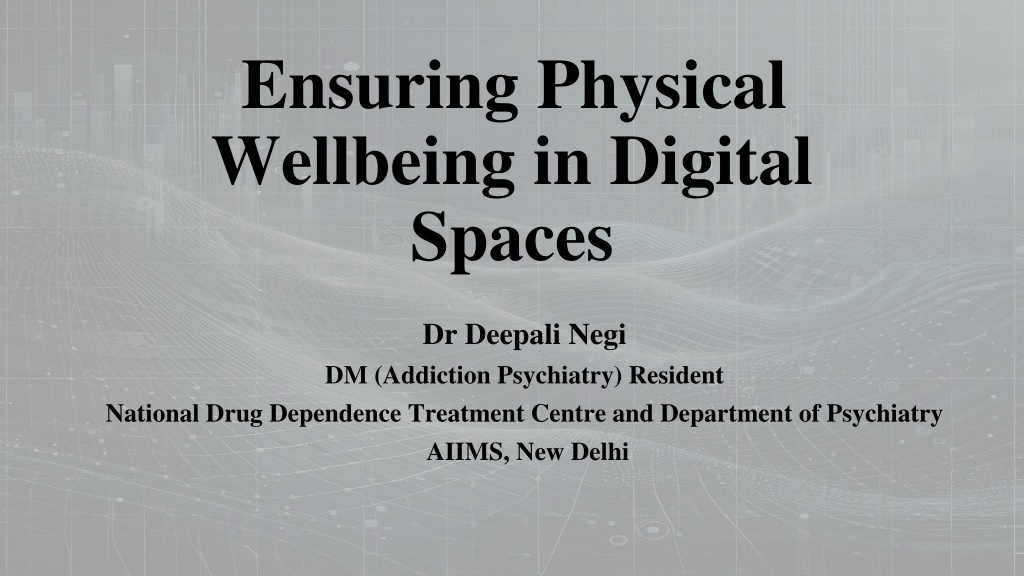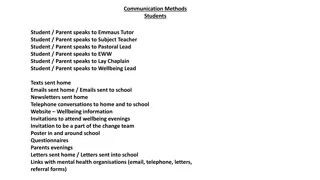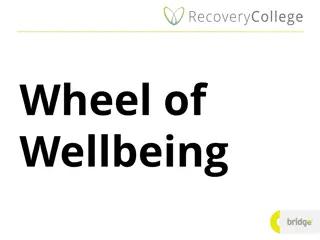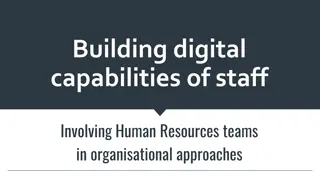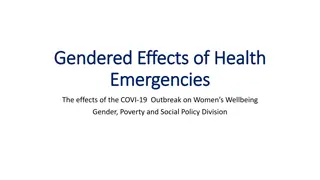Ensuring Physical Wellbeing in Digital Spaces by Dr. Deepali Negi
Dr. Deepali Negi, an Addiction Psychiatry specialist at AIIMS, highlights the importance of maintaining physical health in digital spaces. She discusses the positive and dark sides of digital space, effects on physical health, sleep disruptions, and dimensions of health. Providing insights into the impact of digital use on sleep and overall health, she emphasizes the need for balance and awareness in the digital era.
Download Presentation

Please find below an Image/Link to download the presentation.
The content on the website is provided AS IS for your information and personal use only. It may not be sold, licensed, or shared on other websites without obtaining consent from the author. Download presentation by click this link. If you encounter any issues during the download, it is possible that the publisher has removed the file from their server.
E N D
Presentation Transcript
Ensuring Physical Wellbeing in Digital Spaces Dr Deepali Negi DM (Addiction Psychiatry) Resident National Drug Dependence Treatment Centre and Department of Psychiatry AIIMS, New Delhi
DIGITAL SPACE V/S CYBER SPACE Dr. Deepali Negi, NDDTC (AIIMS, DELHI)
A BALANCED PERSPECTIVE The positive side of digital space Dr. Deepali Negi, NDDTC (AIIMS, DELHI)
DARK SIDE OF DIGITAL SPACE Techno-stress Information overload and spam IT addiction and IT anxiety Hacking and malware Privacy concerns Online theft, cyberbullying, cybercrime, sexual crimes Role of AI : Prejudicial results, AI singularity Dr. Deepali Negi, NDDTC (AIIMS, DELHI)
WHAT IS HEALTH? Health is a state of complete physical, mental and social well- being and not merely the absence of disease or infirmity (WHO 2001) Dr. Deepali Negi, NDDTC (AIIMS, DELHI)
DIMENSIONS OF HEALTH Dr. Deepali Negi, NDDTC (AIIMS, DELHI)
GOOD PHYSICAL HEALTH: A state of well-being where all of the body's internal and external parts, organs, tissues, and cells are functioning properly Dr. Deepali Negi, NDDTC (AIIMS, DELHI)
Physical Ill-Effects Of Digital Use Effect on sleep Effect on cardiovascular system Effect on vision Effect on musculoskeletal system Effect on hearing Effect on neurophysiological system Other possible effect on physical health Dr. Deepali Negi, NDDTC (AIIMS, DELHI)
Displacing other more physical activities Exposure to bright white/blue light may interfere with the melatonin production of the body and thus interfere with the circadian rhythm Notifications can keep one awake Social media and FOMO keeping people awake Higher mental workload due to multi-tasking which can cause increased stress levels and decreased quality of sleep Dr. Deepali Negi, NDDTC (AIIMS, DELHI)
What can we do about it: UNIVERSAL SLEEP HYGIENE Practice healthy sleep habits 1. Maintain regular sleep-wake patterns and a consistent pre-sleep routine (wind down). 2. Arise at about the same time each day (7 days a week), regardless of sleep quantity or quality the night before. 3. Avoid extended naps to compensate for poor nighttime sleep (limit naps to 30 minutes). 4. Establish a relaxing bedtime ritual (discontinue stress-provoking activities well before bedtime). Dr. Deepali Negi, NDDTC (AIIMS, DELHI)
Control Environmental Factors 1. Set a wake-up alarm and keep the clock face turned away. Do not focus on how much time is spent awake in the middle of the night. 2. Avoid bringing electronic devices (e.g., mobile phones and tablets) to bed and do not check emails or surf the web in bed. 3. Keep the sleeping environment dark, quiet, comfortable, and slightly on the cool side. 4. Use a white noise machine to screen out background noise and increase arousal threshold. Dr. Deepali Negi, NDDTC (AIIMS, DELHI)
Exercise 1. Exercise regularly each day; moderate to vigorous exercise for 30 minutes, 3 to 4 days per week or more is likely to improve sleep quality. 2. Avoid vigorous exercise right before bedtime; 2 to 3 hours prior to habitual bedtime is okay and may help deepen sleep.
Limit Stimulating Substances 1. Eat regular meals and avoid heavy, spicy foods for 2 hours before bedtime. 2. Avoid substance use before bedtime and never smoke in the middle of the night. 3. Reduce caffeine use and discontinue all caffeine 8 hours before bedtime (eg, coffee, tea, soft drinks, chocolate) Dr. Deepali Negi, NDDTC (AIIMS, DELHI)
Effect of Digital Space on Cardiovascular System
Obesity is a direct and tangible effect of decrease physical activities resulting from media usage Impact of advertisements/fads on the diet of individuals Chronic sympathetic arousal and its effect on CVS Cortisol dysregulation in children consuming more than 3 hours of media/day Studies have linked decreased insulin sensitivity with increasing television, video game or computer use Dr. Deepali Negi, NDDTC (AIIMS, DELHI)
What can we do about it? Healthy food choices: Encourage fresh fruits and vegetables, whole grains and fat-free or low fat milk instead of processed food. Buy fewer high-calorie low-nutrient food. Include variety of protein food. Avoid labelling food as good or bad . Get involved in planning, shopping and preparing meals. Discourage eating meals while watching tv. Dr. Deepali Negi, NDDTC (AIIMS, DELHI)
What can we do about it? Active life style: Focus on good health and not a certain weight goal. Model healthy and positive attitudes towards food and physical activity. Walk or cycle when required. Engage in active chores. Limit the amount of time watching TV, playing videogames or working on computer. Encourage physical activity. Participate in family physical activity time regularly. Provide safe accessible area for children to play. Dr. Deepali Negi, NDDTC (AIIMS, DELHI)
Effect of Digital Space on Vision
Computer Vision Syndrome(CVS) and Digital Eye Strain(DES) Headaches Impaired vision increased incidence of myopia Dry eyes and irritation Studies report, with increasing screen time, the dominant eye develops transient diplopia, refractory problems and eventually decreased acuity Dr. Deepali Negi, NDDTC (AIIMS, DELHI)
What can we do about it? Take eye breaks: (20-20-20 rule) every 20 minutes, look at something at least 20 feet away for at least 20 seconds. Blink often to refresh to refresh your eyes. Adjust monitor directly in front at an arm s length away so that your eye gazes slightly downward. Use artificial tears. Can help prevent and relieve dry eyes. Choose the right eyewear. Dr. Deepali Negi, NDDTC (AIIMS, DELHI)
What can we do about it? Adjust the lighting and check for glares which can strain your eyes. Monitoring screen time Adjust your screen settings. Dr. Deepali Negi, NDDTC (AIIMS, DELHI)
Effect of Digital Space on Musculoskeletal system
Decreased exercise Odd postures Musculoskeletal strain and pain Carpal tunnel syndromes Neck rigidity and pain due to downward gaze Bone mineral density lower in boys who play video games for extended periods of time Dr. Deepali Negi, NDDTC (AIIMS, DELHI)
What can we do about it? Take breaks: Stand, stretch and walk at least a minute or two every half hour. Dr. Deepali Negi, NDDTC (AIIMS, DELHI)
Proper Posture Dr. Deepali Negi, NDDTC (AIIMS, DELHI)
Setting Digital equipment needs to be placed at appropriate and convenient locations for easy access Use posture friendly props and chairs. Set up the top of your screen at 15-20 degree to the eye level. Desk exercises and stretches Dr. Deepali Negi, NDDTC (AIIMS, DELHI)
Effect of Digital Space on Hearing
Noise-induced Hearing: Loss from overuse of earphones at high volume Activate volume control limits on devices. Limit listening time Take regular breaks Use over-ear headphones instead of earphones. Get regular hearing tests Dr. Deepali Negi, NDDTC (AIIMS, DELHI)
Neurophysiological Effects of Digital Space
Neurophysiological effects of Internet addiction Numerous investigations so far have concluded that any form of addiction to the internet causes structural changes in the brain, specifically in its frontal lobe. The ability to filter out irrelevant information and a reduced capacity for coping with demanding and complex tasks are related to such structural alterations. Studies on TV exposure among pre-schoolers have found discord during decision making processes and white matter changes Dr. Deepali Negi, NDDTC (AIIMS, DELHI)
What can we do about it? Digital diet Reduce the number of apps to only essential ones Turn off notifications Recognize triggers of phone use Set goals for when you can use your smartphone Turn off your phone at certain times of the day Dr. Deepali Negi, NDDTC (AIIMS, DELHI)
Other Possible Effect on Physical Health
Effects on Fertility Studies on the link of EMR emitted by mobile phones on male fertility and sperm count. Thermal and non thermal effects: Thermal Increased temperature of testes can interfere with spermatogenesis Non-thermal: Reactive oxygen species (ROS) may be produced more frequently as a result of nonthermal interactions, which may cause DNA damage. A little amount of ROS has a crucial functional role in the acrosome response, binding to the oocyte, as well as sperm capacitation. Dr. Deepali Negi, NDDTC (AIIMS, DELHI)
Mobile phones use electromagnetic in the microwave range. Other digital wireless systems, such as data communication networks, The WHO have classified mobile phone radiation on the IARC scale into Group 2B - possibly carcinogenic. That means that there "could be some risk" of carcinogenicity. The results of some studies and International Commission of Non Ionization Radiation Protection (ICNIRP) reports showed the people who spend more than 50 minutes a day using a cell phone could have early dementia or other thermal damage. Dr. Deepali Negi, NDDTC (AIIMS, DELHI)
Good Digital Practices Keep TV/ laptops/ computers etc in a common area and definitely out of bedrooms. Develop digital rules in consultation with children, and follow it. Disconnect regularly and for healthy periods of time. Balanced online-offline activities. Sleep without your phone Regular physical activities during breaks Regular interaction of parents with children Dr. Deepali Negi, NDDTC (AIIMS, DELHI)
Good Digital Practices Focus on safety. Orientation on do s & don ts of cyber security. Understanding privacy and risks of internet use vetting sources Dodging overstimulation and misinformation Limiting apps and notifications Use parental controls in devices and enable safe search in browsers while children are surfing the web. Awareness about cyber bullying. Do not disseminate unverified information Dr. Deepali Negi, NDDTC (AIIMS, DELHI)
Conclusion: Focus on a Better Future Use the digital space for its positives Accessing new information and developing new skills Increase social connectivity and collaboration Dr. Deepali Negi, NDDTC (AIIMS, DELHI)
THANK-YOU Dr. Deepali Negi, NDDTC (AIIMS, DELHI)
